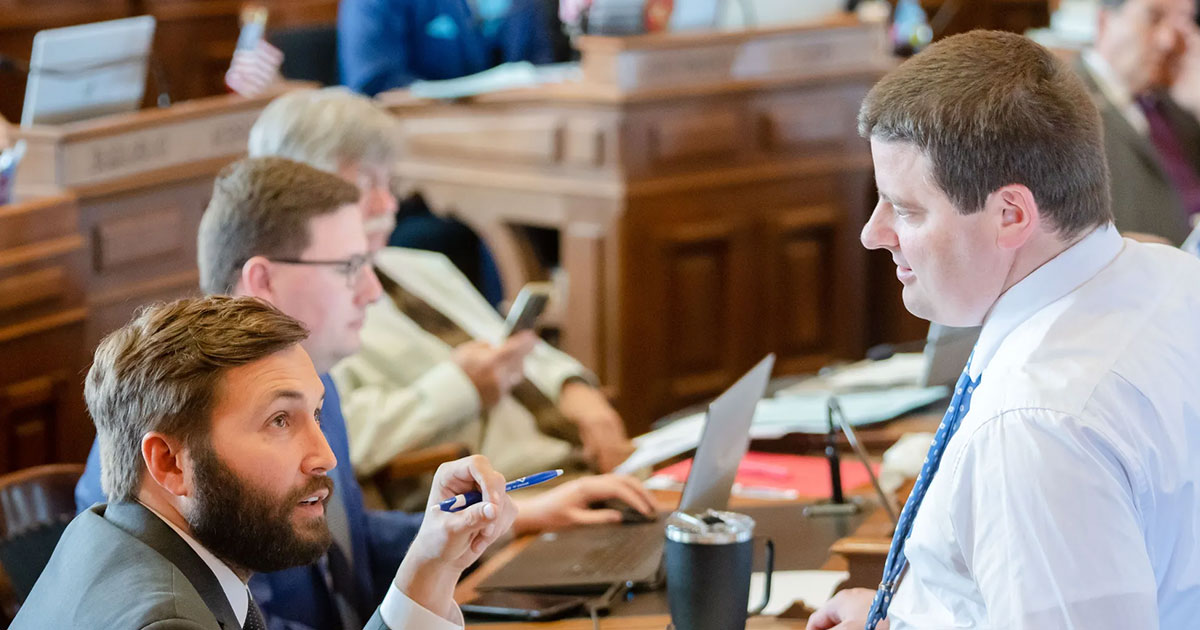This month, the state Revenue Estimating Conference released new estimates indicating that Iowa’s revenue is projected to decline by $602 million, or 6.2%, in comparison to fiscal year 2024. State revenue is projected to decline by an additional $428 million, representing a 4.7% decrease in fiscal year 2026, which commences on July 1, 2025. Republicans are linking the decline in projected revenue to the implementation of their 3.8% flat income tax rate set to begin next year. Republicans are advocating for the elimination of the state income tax, a move that Sen. Jack Whitver has referred to as a “confiscation.”
Republicans have reported a budget surplus of $2 billion, alongside $961 million in reserve accounts and $3.75 billion in the Taxpayer Relief Fund, originally intended for tax reduction efforts. In total, the figure stands at approximately $6.75 billion. One pertinent inquiry is: Why?
Republicans implemented a long-term strategy aimed at reducing revenues through the flax tax during a period marked by significant volatility stemming from the COVID-19 pandemic and its aftermath. The federal government has implemented a historic fiscal stimulus package, amounting to $5.2 trillion, aimed at supporting states and their economies. Federal financial supports provided on a one-time basis have led to a decrease in state costs while simultaneously inflating revenues in a manner that may not reflect sustainable economic conditions. Recently, Pew Charitable Trusts reported that the mix of temporary funding supporting budgets alongside the implementation of new ongoing expenditures or tax reductions has placed numerous states in a vulnerable situation. Policymakers are currently facing the challenge of addressing the potential structural imbalances in their states’ finances, which may lead to deficits as one-time funds diminish while new commitments persist.
In a move that reflects a strategic response to current economic uncertainties, Republicans have swiftly moved to implement a flat tax. This decision comes at a time when the future of tax revenues remains highly uncertain.
With the waning of the COVID economic booster, numerous states are witnessing notable declines in tax revenue when measured against their 15-year trend. Iowa found itself among the states facing a negative difference in the fourth quarter of 2023, notably prior to the implementation of the flat income tax. Iowa reported a 6% decline in revenue compared to its historical trend, marking the fourth-highest discrepancy among states that experienced negative changes, as noted by Pew.
According to researchers, state tax collections have experienced a decline since reaching their peak in mid-2022. This trend is largely attributed to a decrease from the unusually high revenues seen during the pandemic. Concerns are mounting regarding the long-term affordability of budgetary commitments made by states in the past three years, including tax relief measures and salary increases for public employees.
Iowa Republicans are pushing to enshrine their COVID-fueled tax cut in the Iowa Constitution. In the most recent session, Republicans successfully passed a constitutional amendment mandating that a two-thirds majority in both chambers of the state Legislature is necessary to approve any bill aimed at raising individual or corporate income tax rates. Legislation is anticipated to be passed a second time during this session, potentially placing it on the ballot for voters in November 2026. The recent tax cut, implemented in a rush, raises concerns about its long-term impact on future Iowans, especially given the context of unusually high revenue and decreased state expenditures.
Republicans are expected to accumulate Iowa’s surpluses, utilizing them to address anticipated revenue shortfalls ahead of the November 2026 vote on the constitutional amendment. This strategy appears aimed at concealing from the electorate the genuine and enduring consequences of their strategic move towards a flat tax.
This year, Republicans and Governor Kim Reynolds enacted Senate File 2442, which notably altered the regulations governing the utilization of the Taxpayer Relief Fund. A section located in the penultimate division of a 35-page bill stipulates that if the actual net revenue falls short of the budgeted expenses, “there is transferred from the taxpayer relief fund to the general fund of the state an amount equal to fifty percent of the difference or the remaining balance of the taxpayer relief fund, whichever is lower.” The statement suggests a proactive concealment of the likely outcomes associated with the Republican flat tax, as acknowledged by members of the Republican Party themselves.
Iowa Republicans are deviating from the original intent of the Taxpayer Relief Fund. The use of previously paid taxes to address budget shortfalls resulting from a tax cut cannot be accurately described as “taxpayer relief.” Many would refer to that as a shell game. It resembles the act of granting oneself a “raise” by shifting a dollar from one pocket to another. Why not return those “confiscated” funds directly to Iowans through refunds? However, that could potentially ruin the enjoyment of the game, wouldn’t it?
Currently, there are unmet needs and underfunded state accounts. The situation is expected to deteriorate further.
Governor Reynolds asserts that Republicans are dedicated to reducing the size and scope of government. Shouldn’t elected officials prioritize ensuring that our government is the “right size” before making decisions about its reduction? The appropriate scale is essential to effectively address fundamental needs that individuals are unable to fulfill independently, regardless of their financial resources. This includes critical tasks such as disaster prevention and mitigation, maintaining safe infrastructure like bridges and roads, ensuring that pensions are adequately funded, restoring Iowa’s polluted waters, and supporting public schools to cover their operational expenses.





